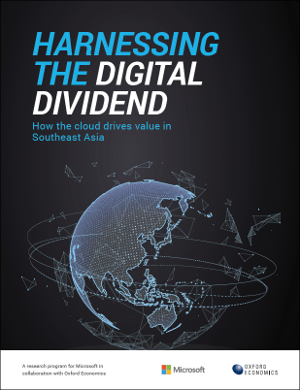Ungated Post | 01 Jun 2018
Harnessing the Digital Dividend

Oxford Economics developed 9 case studies across Singapore, Indonesia, and Thailand to better understand the catalytic effects created by the adoption of cloud computing. We interviewed private businesses, NGOs and government institutions. We found that cloud gives companies new flexibility to innovate, to collaborate and to amplify their business practices. In many organizations it drove major improvements in efficiency and helped create new sources of revenue. But progress could be constrained unless the broadband infrastructure improves across the region, and more resources are devoted to education and training.
Oxford Economics’ team is expert at applying advanced economic tools that provide valuable insights into today’s most pressing business, financial, and policy issues.
To find out more about our capabilities, contact:
Americas
Diantha Redd
+1 (646) 503 3052
Email
Asia Pacific
Peter Suomi
+65 6850 0110
Email
EMEA
Aoife Pearson
+44 (0)203 910 8054
Email
Related Services

Post
KPMG M&A Outlook 2026: Between Uncertainty, Resilience, and Seizing Opportunities
Discover how Germany’s M&A landscape is evolving – with a focus on growth, AI and post-merger value creation.
Find Out More
Post
Silver, the next generation metal
This report highlights the critical role silver plays in data centres and artificial intelligence (AI), automotive and electric vehicles (EVs), and solar energy photovoltaics (PVs). With these sectors expected to expand significantly over the coming years, we expect future silver demand to be strong.
Find Out More
Post
Powering the UK Data Boom: The Nuclear Solution to the UK’s Data Centre Energy Crunch
The UK’s data centre sector is expanding rapidly as digitalisation, cloud computing, and artificial intelligence (AI) drive surging demand for high-performance computing infrastructure.
Find Out More